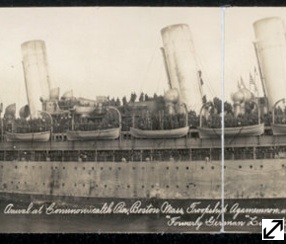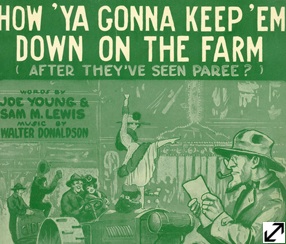
Finale of ‘The War to End All Wars’
Dedication of World War I Monument in Post Office Plaza, 1925
Original photograph in collection of the Greenwich Library
World War Medal, 1919
The Town of Greenwich Connecticut presents this medal for service in a righteous cause
Designed by Nathan Potter
Cast by Gorham Company, Providence, Rhode Island
Greenwich Historical Society, William E. Finch, Jr. Archives, Gift of William E. Finch, Jr.
These bronze medals were presented to Greenwich service personnel at a "Welcome Home" dinner dance held on July 4, 1919.
Good Bye Old Khaki Lid, 1918
Lyrics by Lee M. Walker, Music by Arthur Lamont
Published by F. B. Haviland Pub. Co. Inc.
Greenwich Historical Society, William E. Finch, Jr. Archives, Gift of Karin Crooks
How 'Ya Gonna Keep 'Em Down on the Farm
(After They've Seen Paree?), 1919
Lyrics by Joe Young (1889-1939) and Sam M. Lewis (1885-1959)
Music by Walter Donaldson (1893-1947)
Published by Waterson, Berlin & Snyder Co.
Lent by Stefanie Kies
Mother Here's Your Boy!, 1918
Lyrics by Sidney D. Mitchell (1888-1942), Archie Gottler (1896-1959) and Theodore F. Morse (1873-1924)
Music by Sidney D. Mitchell (1888-1942)
Published by Leo Feist, Inc.
Lent by Stefanie Kies
Jennie Cotroneo on Armistice Day, November 11, 1918
Greenwich Historical Society, William E. Finch, Jr. Archives, Gift of Jennie Tropiano
The Great War's Legacy
"The eleventh hour of the eleventh day of the eleventh month" famously marked the ceasefire on the Western Front in Europe. Once Germany had signed the Armistice, the Allied Powers celebrated. In Greenwich as elsewhere in America, bells rang, whistles blew and people took to the streets in celebration. At the very end of 1918, Americans and other Allied troops marched into Germany. President Wilson arrived in Paris to attend the peace conference which resulted in the Treaty of Versailles signed on June 28, 1919.
The War made a lasting imprint. It took many months for American military personnel to return to their homes; what they saw and experienced in Europe profoundly affected their world view. In honor of those who would never come back, people in Greenwich and across the nation created public memorials with an intensity never before seen. They also continued to aid devastated civilians in Europe, although not at the high level witnessed during the War years. Due in part to their wartime contributions, women won the right to vote with the ratification of the Nineteenth Amendment. The assimilation of recent immigrants would be pursued with even greater urgency as residual concern about political allegiance discouraged ideas of "dual loyalty." America's standing in the world was forever changed.







